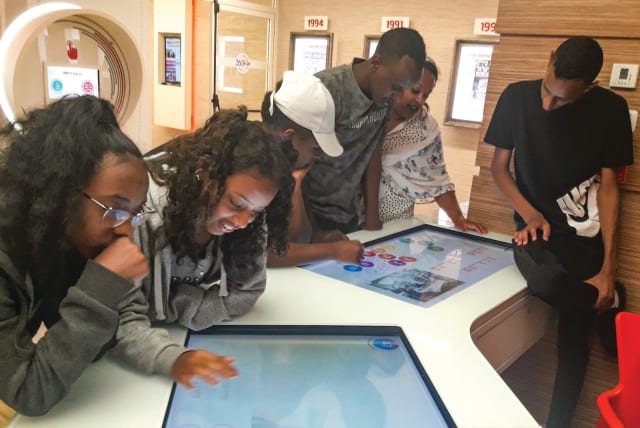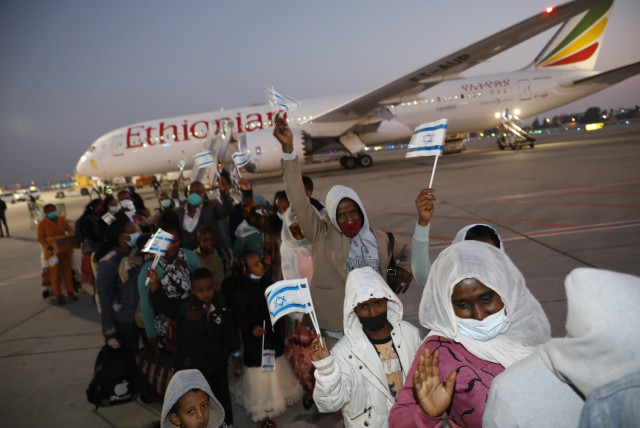Israel is failing Ethiopian Jews - opinion

In order to succeed, we have to ensure that during their school years, our children do not face the same racism that earlier generations experienced.
The State of Israel still has a long way to go before Israelis of Ethiopian descent become truly equal citizens. Independence Day provides an opportunity for us to remind everyone that we are no longer that generation of new immigrants, just yearning to arrive in the Promised Land.
We are Israeli citizens who deserve equal rights – educated, talented, and capable not just of acting on our own behalves, but also of demanding what we deserve. After 75 years in existence, it is high time elected officials flew the flag of equality and justice, and harnessed themselves to the task of advancing the success of young people of Ethiopian descent, thereby ensuring their future. It is also time for them to show that they understand that this is in the nation’s interest.
I immigrated to Israel in 1990 with my brother, my sister and my mother, Herut Tekle. Five of my brothers and sisters had already made aliyah. My mother, recognized as a Prisoner of Zion, had assisted in the immigration of hundreds of Ethiopian Jews.
She did it bit by bit, very cautiously, even after she was apprehended by the Ethiopian authorities and jailed in Addis Ababa for two years.
Year after year, she kept encouraging my brothers and sisters to make aliyah to the Promised Land, having been promised nothing herself. Even after she had been informed by family members that life over here was not a bed of roses, she kept yearning for that moment when she would step down from the plane and fulfill her dream of being in Jerusalem.
An aliyah story
I was 11 when I came here, and spent most of my early years growing up in Hadera. The fact that I was the daughter of a Prisoner of Zion did not open any doors for me. As a new immigrant, I learned Hebrew at an Ulpan for three months, and immediately fitted into the seventh grade with native Hebrew speakers.
When it was time to go to high school, all of the psycho-technical and excellence examinations most of my classmates went through simply passed me by and were not offered to me. When I approached the school principal and demanded to go to a high school like everyone else, the astounded response was: “Why don’t you go to a religious school or boarding school?”
Only after having insisted on completing the same examinations did I manage to evade the track outlined for me and be accepted, like all my classmates, to a secular state high school. Today I can say that I inherited my persistence and resolve from my mother.
Not every member of my generation was lucky enough to be born to a militant Prisoner of Zion mother or to a physician father. Most of those who already possessed educational credentials, never received official recognition for them when they arrived in Israel. At the same time, our parents cherished their arrival in the Promised Land so much that they never dared open their mouths at any incident of racism, even when it involved their dearest family members.
The future is not assured
The more severe problem is the fact that in Israel today, the future of our children – even those who were born here – is not assured because of the color of their skin. Around a month ago, we witnessed a disgraceful incident of racism at a school in Netivot, where, in anticipation of an annual trip, teachers formed a WhatsApp group titled “Annual Trip: Black Girls.”
In the group, the teachers ridiculed and mocked their pupils who were of Ethiopian descent. The media and public exploded in a furor, but apart from a warning, the teachers kept their positions and today they continue to educate pupils.
Although this incident was publicized due to the resourcefulness of the students themselves, in Israel today, much of the prevailing racism remains latent and transparent. “Olim Beyahad,” is an organization which aims to change the perceptions and negative views of Israeli society toward Israelis of Ethiopian descent through high-quality employment. We have established that it is not enough for us to just open doors and advance in the workplace.
In order to succeed, we have to ensure that during their school years, our children do not face the same racism that my generation experienced.
One of the crowning glories of our organization is the “Ariella” excellence program, in which hundreds of seventh to twelfth graders, receive afternoon “booster” classes in five points mathematics, English and other scientific subjects (STEM – Science, Technology, Engineering & Mathematics).
This program includes not just curricular “boosting”, but also personal coaching for students, introduction to diverse content and ethical issues, and dedicated seminars for parents. It was established to reinforce the support network for students to encourage success at home as well as in school.
THE SECRET to the success of this program is the fact that we do not operate in a “wham-bam” instant gratification manner. Instead, it is a long-term program attended by participants over a number of years. Their needs are placed at the center of the program, as is their perception of themselves and what they could become.
Similar programs are offered to outstanding university students and to children and youngsters who excel in specific areas such as music or sports – pursuits that our parents never had the privilege of turning into careers. Today, we identify these outstanding individuals at an early age and watch them grow and develop into promising, leading and talented people.
Our activities cannot take place in a vacuum. In order to avoid a situation in which these young people – even those with impressive academic records – face humiliation when applying for quality or senior positions (e.g. health care, law, engineering, accounting, cybersecurity or hi-tech), the State of Israel must fully enforce the relevant government resolutions.
These resolutions were consolidated in the Palmor report, issued pursuant to the protest by members of the Ethiopian Israeli community in 2016. A government resolution prescribed a budget to the Ministry of Education for dedicated educational programs on racism aimed at teachers and public servants.
Although the budget and resources were allocated, very little has been done in practical terms; the resolutions have not been implemented, but have remained mere recommendations, and there has been no tangible change in the field.
Children need support in order to succeed
Instead, we have children born in Gedera and Netanya, for example, who could be accepted into Tel Aviv University if only their teachers and school believed in them, just as their parents believe in them and they believe in themselves.
Kiryat Gat, Hadera and Afula have talented students of Ethiopian descent – potential lawyers and software developers – who could fulfill their potential if only employers were truly color-blind and enabled diversity.
If the government used a portion of those resources allocated to the development of the numerous governmental systems and institutions, to invest in diversity training of public servants, the system would then become truly color blind.
Only by combining forces with us – the organizations endeavoring to change reality – will we all succeed in changing the perceptions of Israelis of Ethiopian descent. This would in turn establish equal opportunities for all, from which the state would doubtless benefit and prosper.
The writer is vice president of program development and partnership at Olim Beyahad.
Jerusalem Post Store
`; document.getElementById("linkPremium").innerHTML = cont; var divWithLink = document.getElementById("premium-link"); if (divWithLink !== null && divWithLink !== 'undefined') { divWithLink.style.border = "solid 1px #cb0f3e"; divWithLink.style.textAlign = "center"; divWithLink.style.marginBottom = "15px"; divWithLink.style.marginTop = "15px"; divWithLink.style.width = "100%"; divWithLink.style.backgroundColor = "#122952"; divWithLink.style.color = "#ffffff"; divWithLink.style.lineHeight = "1.5"; } } (function (v, i) { });

